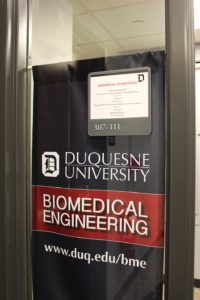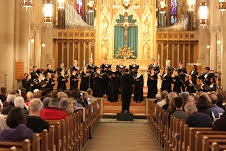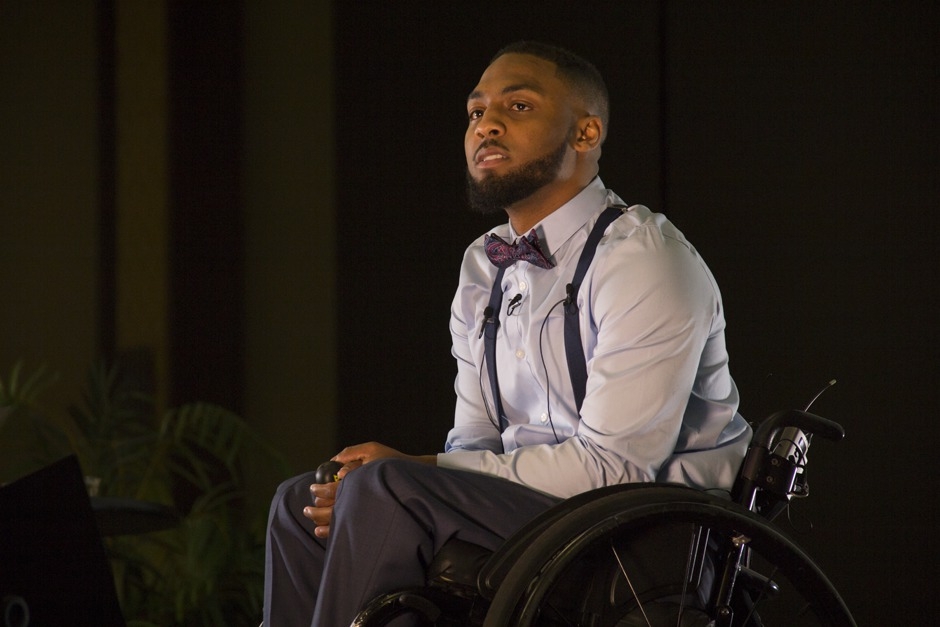
The Biomedical Engineering department is based in Libermann Hall. A new program offers to place Liberal Arts students to work alongside the engineering majors.
Michael Marafino | Staff Writer
10/26/17
The expansion of the involvement of science aiding those in society highly depends on the collaboration between engineers and those with an entrepreneurial mindset. Duquesne University’s Biomedical Engineering Program is training a new generation of engineers and giving them real-life scenarios to work in.
Duquesne’s Biomedical Engineering program allows students interested in working in fields involving medicine, science, technology, engineering and mathematics to be educated on these subjects and learn about their real-life applications.
The program’s mission statement says, “Duquesne University Biomedical Engineering Program provides our students with a rigorous education in mathematics, science, engineering and the liberal arts in line with the Spiritan ideals of service to others. Our students are actively involved with our research goals to improve human health, building upon their formal education to ultimately serve God by serving others.”
The program is beginning to gain momentum in its reputation among other biomedical engineering programs. In fact, the program is on track to receive its Accreditation Board for Engineering and Technology (ABET) accreditation. The accreditation commends colleges and universities for excellence in applied science, computer science and engineering.
The program is currently working on a new twist on the development of upcoming engineers; it allows students in the school of Biomedical Engineering to work on a capstone project for their senior year.
“The way I teach this course is to have these seven teams treat their projects as the key technology of a medical device startup company,” said John Viator, the director of the biomedical engineering program.
Viator also is attempting to team up members of other schools of study, primarily those in the Liberal Arts school, with biomedical engineering majors in order to take new approaches to the process of biomedical entrepreneurship.
“Having had a few startups myself, I’ve noticed that while the design and testing comes from engineers, the leadership, including CEOs, are usually not engineers. More often than not, I’ve noted that the CEOs were educated in the liberal arts,” he said. “Because of this observation, I thought it would be innovative to include juniors and seniors in the McAnulty School in our engineering capstone teams to act as CEOs of these ventures.”
Viator added that many CEO’s he saw in his research had degrees in political science, history, english and many other humanities.
His reasoning behind seeking liberal arts students is because he wishes to reflect real life situations where engineers can do their science and technological functions, while the people educated in humanities may act as leadership in the start-up. Viator said that liberal arts students possess certain useful skills, such as the abilities to analyze readings, fluently write and understand other people.
Connor Evans, a current biomedical engineering senior, gave his opinion on the project and its benefits.
“It’s a way of combining the knowledge that I’ve obtained over the previous three years in the BME program into good use on an industry-relevant project,” he said.
It is important to have a background in business and entrepreneurship because many graduates of the program will go on to be clinicians, and some will go into research, according to Viator.
However, at some point most of them will be creating new medical devices, and having a basic understanding of business will help them market, sell and distribute those products.
Viator is seeking anyone who is well-educated, motivated, positive and interested in the project. If anyone is intrigued, he can be reached at viatorj@duq.edu.



